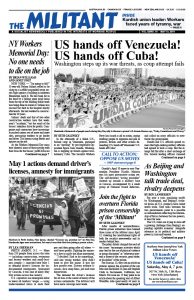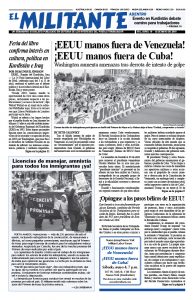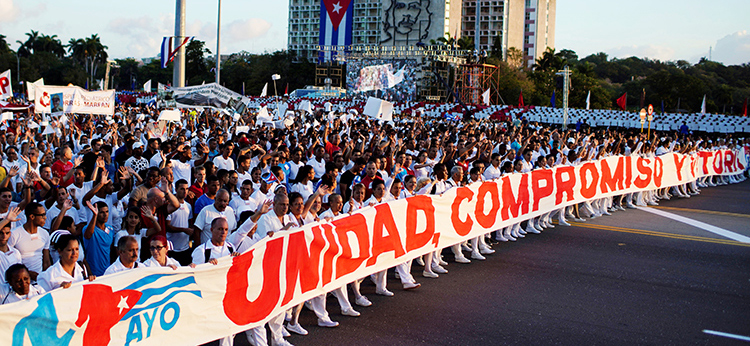In the aftermath of a failed U.S.-backed coup in Venezuela, packaged as an “uprising” by pro-imperialist opposition figure Juan Guaidó, Washington is stepping up threats against revolutionary Cuba. The Socialist Workers Party has issued a call to action, urging working people to organize and join in protests, forums and other actions demanding U.S. hands off Venezuela! U.S. hands off Cuba!
Guaidó’s April 30 move to oust Venezuelan President Nicolás Maduro was his most provocative action yet. The self-declared “acting president” showed up outside a military base in Caracas, accompanied by a small group of National Guard defectors, and called on army officials to overthrow the government.
Guaidó and U.S. officials spread rumors that high-ranking military officials had agreed to back a coup. But the attempt fell flat after a short exchange of fire. Several leading officers rumored to be defecting instead announced they backed the government. The next day, Guaidó and defenders of the government held competing rallies.
President Donald Trump and other administration officials threatened the government and people of Cuba. “If Cuban Troops and Militia do not immediately CEASE military and other operations for the purpose of causing death and destruction to the Constitution of Venezuela, a full and complete embargo, together with highest-level sanctions, will be placed on the island of Cuba,” Trump threatened in an April 30 tweet. “Hopefully, all Cuban soldiers will promptly and peacefully return to their island!”
But the U.S. government knows full well that the 20,000 Cuban internationalist volunteers in Venezuela are overwhelmingly doctors, nurses, sports and dance instructors and teachers. They are respected by many working people for working in some of the poorest neighborhoods and most isolated regions of Venezuela.
Washington has carried out an embargo of Cuba — sometimes tighter, sometimes looser — since soon after working people overthrew the dictatorship of Fulgencio Batista in 1959. The U.S. rulers — no matter what party is in the White House — have never forgiven the Cuban people for bringing to power a government of workers and farmers.
The White House recently announced measures tightening the embargo, including a cap on remittances by Cuban-Americans to relatives on the island and allowing U.S. citizens to sue over properties expropriated during the revolution. Washington also announced it will impose as yet unspecified restrictions on travel to Cuba.
A “complete” embargo could only be enforced through naval action, which would be considered an act of war by any nation on the planet targeted by such military action. The White House hasn’t yet taken any steps to implement this threat, however — and it’s in the class interests of working people in Cuba, the U.S. and worldwide to make sure Washington never does.
Cuban President Miguel Díaz-Canel and the Ministry of Foreign Affairs issued statements condemning the blatant U.S. violation of Venezuelan sovereignty and its lies and threats against Cuba.
Secretary of State Mike Pompeo said that “military action is possible. If that’s what’s required, that’s what the United States will do.” White House National Security Adviser John Bolton told MSNBC that “all options are open” in Venezuela, as did Gen. Joseph Dunford Jr., chairman of the Joint Chiefs of Staff. Acting Defense Secretary Pat Shanahan canceled a trip to Europe to remain at the Pentagon.
It’s not just Trump’s Republican allies who are backing the threats. Democratic presidential candidate and former Vice President Joe Biden said April 30, “The U.S. must stand with the National Assembly & Guaidó in their efforts to restore democracy.” Democratic House Speaker Nancy Pelosi called on Maduro “to acknowledge the will of the Venezuelan people.”
The governments and people of Cuba and Venezuela have had close relations since 1998 when Hugo Chávez won election as Venezuelan president in the midst of a rise in struggles by working people. Thousands of Cuban internationalists have aided social programs there, and Caracas has provided Cuba with inexpensive oil.
The U.S.-backed opposition, which attempted a coup against Chávez in 2002, has been banking on the deep economic and social crisis in Venezuela to win support for overthrowing the government. They are focused on trying to turn the military officer corps.
The crisis has been exacerbated by the policies of the Chávez and Maduro governments, which tried to “regulate” capitalist relations, as many in the state and ruling party apparatus enriched themselves. Today there are widespread shortages of food and medicine and runaway inflation. Millions of working people and those in the middle classes have fled the country.
Washington is pressuring Moscow to get Maduro to resign. The May 1 New York Times cited a State Department report that Pompeo told Russian Foreign Minister Sergey Lavrov that Moscow’s friendly relations with the Maduro government are “destabilizing” for the “U.S.-Russia bilateral relationship.”
Russia’s state-owned oil company has heavily invested in Venezuela’s oil industry, including billions of dollars in loans.
Washington is not holding out any offer of friendlier relations with Havana, regardless of how the struggle unfolds in Venezuela, and working people in Cuba know that.
“Millions of Cubans took to the streets on Wednesday [May 1] in protest over new sanctions imposed on the Caribbean island by the Trump administration and U.S. efforts to topple the government of socialist ally Venezuela,” Reuters reported.


